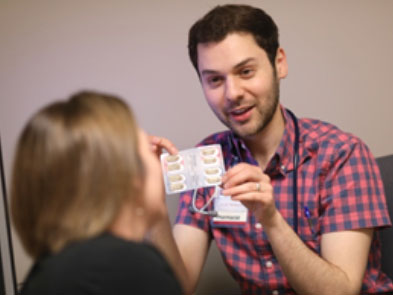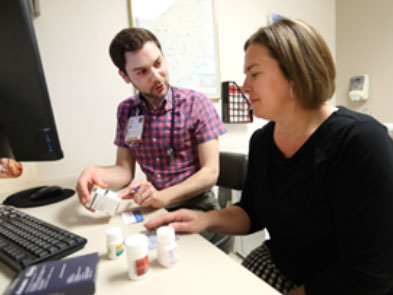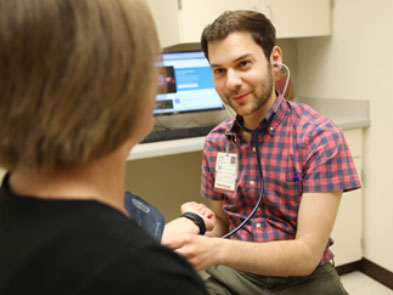Learn more about the duties, practice settings, typical workdays, and educational opportunities, as well as personal advice from pharmacists in this practice area.
 What is ambulatory care?
What is ambulatory care?
Ambulatory care is a pharmacy practice area in which the patients are seen in an outpatient setting. This means patients do not get admitted to the hospital and instead visit clinics and offices to meet with providers. Pharmacists in ambulatory care often work within a collaborative practice agreement with their physicians to manage chronic disease states for their patients. Pharmacists often provide medication, disease state, and dietary education to the patient.
Where does an ambulatory care pharmacist work?
An ambulatory pharmacist can work in a variety of practice settings. Most often, it is in an outpatient clinic, which could be associated with a large academic health center, a private practice, or a smaller community health system.
 What does a typical workday look like?
What does a typical workday look like?
For an ambulatory care pharmacist, a typical workday involves seeing patients in a clinic similar to how a physician would. Patients may be seen for a variety of reasons related to chronic disease state management. For instance, a system may have collaborative practice agreements for conditions such as diabetes, hypertension, asthma/COPD, osteoporosis, HIV pre-exposure prophylaxis, etc. In those instances, pharmacists have their own schedule of patients lined up to see them for the day. The visit may include an assessment of the patient’s condition and changes to their medication or lifestyle regimens. Pharmacists may also have additional roles in ambulatory care settings, such as quality-related initiatives, medication affordability inquiries, and drug information support to provider colleagues in the office.
What educational opportunities are available for pharmacists in this area?
- Ambulatory care pharmacists can become Board Certified in Ambulatory Care (BCACP), and there are other board certifications that may apply, such as geriatrics (BCGP) and advanced diabetes management (BC-ADM). To find out more about board certification you can visit the Board of Pharmacy Specialties Board Certification webpage.
- Many sometimes pursue the Certified Diabetes Educator (CDE) credential, which is not pharmacy-specific but is well known in the diabetes world. There are also additional certificate programs that are disease-specific such as those in diabetes and anticoagulation.
- There are a number of certificate programs individuals can complete to enhance their knowledge in one practice area, including teaching. ASHP has a number of certificate programs available online.
 How can I learn more about this career path?
How can I learn more about this career path?
- ASHP has a dedicated Section of Ambulatory Care Practitioners. By joining the section, you can learn more about the unique needs and practices of this specialty area.
- Many colleges will also have electives on ambulatory care pharmacy that can introduce you to the practice model. The best way to fully understand ambulatory care is hands-on training and mentorship. Talk to preceptors, pharmacy faculty, residents, etc. to learn what their experiences have been.
- Additionally, ASHP has a dedicated Ambulatory Care Resource Center for more information about ambulatory care and tools to help you understand the practice.
Member Career Profiles
 Kristen Abbott, PharmD, BCACP
Kristen Abbott, PharmD, BCACP
Clinical Pharmacy Team Lead – Ambulatory Care
Indiana University Health - Indianapolis, IN
What interested you in pharmacy and this career path?
“During my rotations, I realized that I personally quite enjoy developing long-standing relationships with patients. I did not prefer the acute nature of the inpatient setting where you do not often follow the patient long-term. I also liked being able to sit down and spend some time with the patient to help figure out how to get their disease management under better control. This was not offered in other fields of pharmacy in quite the same way.”
What advice do you have for someone interested in this career field?
“I think exposure is paramount. I would encourage those interested to seek advice and understanding from those who work directly in the field. If possible, I would also recommend they spend some time in the office with someone who is seeing patients in order to get a good view of what the job looks like. I find most people do not have a good idea of this until they participate. The best case scenario would be to apply to an ambulatory pharmacy intern role. There are not a ton of them across the nation, but this is the best way to dip your toe in the water to see if this is a career path you might want to pursue further.”
Member Spotlight
Laura Britton
Credentials: Pharm.D., BCPS, CACP
Position/Title: Supervisor, Ambulatory Services
Organization: University of Utah Health Care
Primary Specialty: Ambulatory Care
Other Specialties: HealthCare Administration
Jenny Van Amburgh
Credentials: B.S. Pharm, Pharm.D., R.Ph., CDE
Position/Title: Associate Clinical Professor / Residency Program Director / Director of Clinical Pharmacy Services
Organization: Northeastern University – School of Pharmacy / Harbor Health Services, Inc.
Primary Specialty: Ambulatory Care


